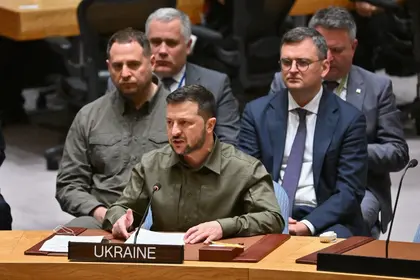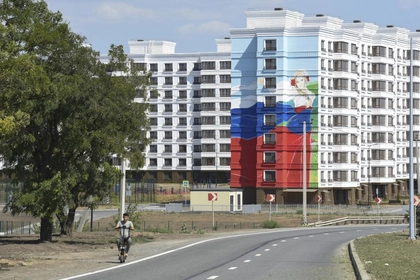Ukrainian President Volodymyr Zelensky on Wednesday, Sep. 20, confronted Russia directly at the UN Security Council, denouncing the Kremlin's invasion of his country as "criminal" and urging the United Nations to strip Moscow of its veto power.
Clad in his trademark military fatigues, Zelensky for the first time since the February 2022 invasion sat in the same room as a Russian official, who responded by scrolling through his smartphone with a look of conspicuous disinterest.
JOIN US ON TELEGRAM
Follow our coverage of the war on the @Kyivpost_official.
"Most of the world recognizes the truth about this war," Zelensky said. "It is a criminal and unprovoked aggression by Russia against our nation aimed at seizing Ukraine's territory and resources."
Zelensky called on the United Nations to vote to end Russia's veto power on the Security Council. He said the move could be among wide-ranging reforms at the Security Council that would include permanent representation for developing nations -- where support for Ukraine has been lukewarm.
"Veto power in the hands of the aggressor is what has pushed the UN into a deadlock," Zelensky said.
"It is impossible to stop the war because all efforts are vetoed by the aggressor or those who condone the aggressor," he said.
Zelensky repeated the Ukrainian stance that the veto power belonged to the former Soviet Union -- one of the victors of World War II after which the United Nations was created -- and not to President Vladimir Putin's Russia.

Ukraine’s Usyk Beats Fury in Heavyweight Championship Rematch
"Unfortunately, this seat in the Security Council, which Russia occupies illegally through backstage manipulations following the collapse of the Soviet Union, has been taken by liars whose job it is to whitewash the aggression and the genocide," Zelensky said.
Taking away Russia's veto power would be exceedingly difficult, with Zelensky acknowledging that Moscow will not "give up this stolen privilege voluntarily."
There is, however, precedent: the General Assembly in 1971 transferred China's veto-wielding seat from Taiwan, then considered the country's representative, to the communist government on the mainland.
Foreign Minister Sergei Lavrov, showing up at the Security Council after Zelensky left, scoffed at the idea of ending Russia's veto and described it as a way to check Western power.
"The use of the veto is an absolutely legitimate tool laid out in the (UN) Charter," Lavrov said. Lavrov denounced Zelensky, who is seeking to win back all territory occupied by Russia, for not negotiating and sought intervention by US Secretary of State Antony Blinken -- who looked at Lavrov as he spoke.
Addressing Blinken, Lavrov said, "I don't think it would be very difficult to give a command for Zelensky to lift the decree" against negotiations. Blinken, who had met Lavrov before the war to warn against an invasion, has largely avoided meeting him since the war and no talks were planned in New York.
In his own remarks as Lavrov entered the room, Blinken recalled a recent visit to Ukraine where he visited a town where bodies of Ukrainian civilians were stacked among the living in a school basement.
"Russia is committing war crimes and crimes against humanity in Ukraine on an almost daily basis," Blinken said.
You can also highlight the text and press Ctrl + Enter






